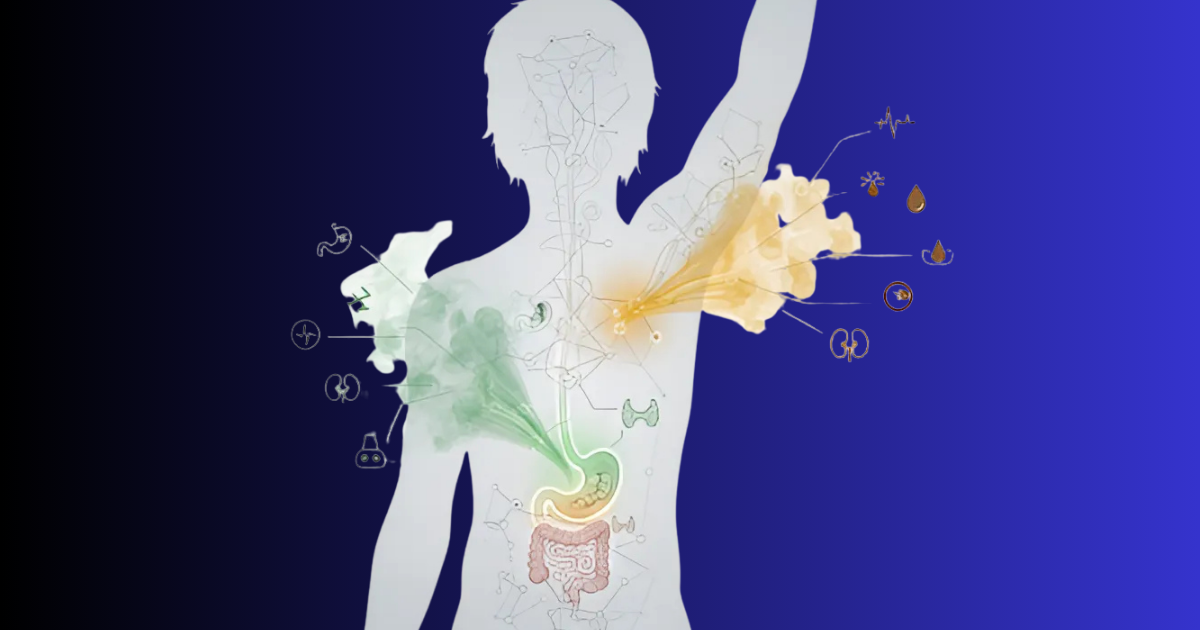What Body Odor Can Reveal About Your Health
We release countless chemical compounds through our pores and even in our breath. While many go unnoticed, some can signal early signs of illness—sometimes years before traditional diagnoses are possible.
One of the most fascinating discoveries in this field came from a Scottish woman named Joy Milne, who realized she could literally smell Parkinson’s disease.
#1The Woman Who Could Smell Parkinson’s
Back in 2012, Milne told neuroscientist Tilo Kunath at the University of Edinburgh that she noticed her husband’s scent had changed years before his Parkinson’s diagnosis. It was a distinct musky odor she later recognized in other patients as well.
Skeptical at first, researchers tested her ability. Milne was asked to smell 12 T-shirts—six worn by Parkinson’s patients and six by healthy individuals. She correctly identified every patient, and even flagged one individual who was later diagnosed with the disease.
Her incredible accuracy stunned scientists and sparked a wave of research into disease detection through scent.
#2Why Body Odor Matters
Our bodies naturally emit a unique “chemical signature.” When that signature changes, it may reflect shifts in our health. For instance, metabolic disorders, infections, and neurodegenerative diseases can all alter how we smell.
Today, scientists are developing advanced methods to detect these chemical biomarkers systematically. Such tools could help doctors diagnose conditions like Parkinson’s, brain injuries, or even cancer—much earlier than ever before
#3The Science of Smell: What Your Body Odor Can Reveal About Hidden Diseases

Body odor isn’t just about sweat or hygiene—it can be a powerful window into your health. Scientists are discovering that the unique chemical signals our bodies release may hold clues to serious diseases, from Parkinson’s to cancer.
When Smell Becomes a Medical Signal
Andreas Mershin, physicist and co-founder of RealNose.ai, puts it bluntly: “It drives me mad that people are dying while we’re still relying on invasive tests, when the signal is already outside and detectable by dogs.”
That “signal” comes from volatile organic compounds (VOCs), tiny molecules released by our metabolism. When disease alters normal body processes, it changes the balance of these compounds—shifting our unique body odor “fingerprint.”
The Super-Smeller Who Changed Parkinson’s Research
Not everyone can detect these signals. But Joy Milne, a Scottish woman with hereditary hyperosmia, can. She famously recognized a musky odor in her husband years before his Parkinson’s diagnosis—and later identified the same scent in other patients.
Her remarkable ability inspired scientists to investigate body odor as a diagnostic tool, with studies now confirming that certain diseases produce consistent, detectable odors.
Diseases That Carry a Distinct Smell
Diabetes (hypoglycemia): fruity or “rotten apple” breath due to ketone buildup.
Liver disease: musty, sulfur-like odor from breath or urine.
Kidney disease: ammonia, fishy, or urine-like breath.
Infections:
Cholera or C. difficile: sweet-smelling stool.
Tuberculosis: foul, stale-beer-like breath and skin odor.
Dogs, Machines, and the Future of Smell-Based Diagnosis
Dogs, with noses up to 100,000 times stronger than ours, have been trained to detect cancers (lung, breast, ovarian, bladder, prostate) with stunning accuracy. One study found dogs identified prostate cancer from urine samples with 99% success.
But training dogs is slow, and not every pup qualifies. That’s where technology comes in. Scientists are now developing robotic noses and chemical analysis tools like gas chromatography-mass spectrometry, which can detect disease-related compounds in a simple skin swab or breath test.
A New Era of Non-Invasive Testing
Perdita Barran, a chemist at the University of Manchester, is leading efforts to create a quick, non-invasive swab test for Parkinson’s. Her team has narrowed down 30 key lipid molecules that consistently differ in patients.
Such a test could help doctors diagnose Parkinson’s years earlier than current methods allow, giving patients a crucial head start on treatment.
Why Smell Matters
As Bruce Kimball of the Monell Chemical Senses Center explains: “If you are suffering from an infection or disease, it’s logical there’s an effect on your metabolism. That change will be realized in the metabolites your body releases—and in your scent.”
In other words, body odor is more than a social detail. It’s a biochemical signature, one that may hold the key to earlier, faster, and more humane diagnosis of diseases that affect millions.
#4How Body Odor Could Help Detect Diseases – From Brain Injuries to Malaria and Cancer
Researchers are increasingly finding that the human body gives off subtle chemical signals that could be used to diagnose serious health conditions.
“We’ve looked at a number of viral and bacterial infections, pancreatic cancer, even rabies,” explains Kimball. “Compared to healthy individuals, it’s very rare that we don’t find measurable differences in volatile organic compounds (VOCs).”
These VOC changes, however, are often too subtle for humans to detect—making dogs or advanced odor-sensing medical devices powerful diagnostic tools for the future.
Kimball and his colleagues are currently developing a test to detect brain injuries in children who play contact sports, based on VOC patterns. In a 2016 study, they found that traumatic brain injuries in mice produced a distinct odor that other mice could be trained to recognize. More recent, yet-to-be-published research reveals that concussions in humans trigger specific ketones in urine within just hours of the injury.
The reason the brain releases these odorants is not yet fully understood, but one theory is that VOCs are by-products of the brain’s repair process. “The ketones we’ve observed suggest the body may be trying to deliver more energy to the brain to support recovery,” says Kimball. This aligns with existing research showing that ketones act as alternative energy sources and may provide neuroprotective benefits after brain injury.
Beyond Brain Injuries: Malaria and Cancer Detection
Body odor may also reveal malaria infections. In 2018, scientists discovered that children with malaria emitted a distinctive “fruity and grassy” smell through their skin, making them more attractive to mosquitoes. By analyzing samples from 56 children in western Kenya, researchers pinpointed aldehydes—specifically heptanal, octanal, and nonanal—as the chemicals behind this odor. This discovery could lead to new malaria diagnostics or even synthetic lures to trap mosquitoes and protect vulnerable communities.
Cancer detection is another promising frontier. Mershin, a former MIT researcher and current head of RealNose.ai, is working on an odor-detecting device capable of identifying prostate cancer—a disease that kills one in 44 men. “The company grew out of nearly two decades of MIT research, initially funded by DARPA, where we were tasked with creating a device that could rival a dog’s nose in sensitivity,” he explains.
The Future of Disease Detection Through Smell
From concussions to malaria and cancer, scientists are proving that body odor carries hidden medical insights. While these scent signatures are imperceptible to the human nose, trained animals and high-tech biosensors could transform how we detect and diagnose diseases—faster, earlier, and with greater accuracy.
#5How AI and Human Senses Are Shaping the Future of Diagnostics
A new device being developed by RealNose.ai is pushing the boundaries of medical technology. It uses real human olfactory receptors, grown from stem cells in the lab, to detect the unique odorant molecules linked to diseases such as prostate cancer. These receptors are paired with machine learning algorithms, which analyze the complex patterns of receptor activation to identify potential health risks.
“Knowing the ingredients isn’t enough,” explains Mershin. “It’s like baking—a list of ingredients doesn’t tell you how the cake will taste or smell. Only when your senses interact with those elements does your brain process them into a meaningful experience. That’s what we’re trying to replicate.”
The research goes beyond cancer. Joy, a woman with an extraordinary ability to smell Parkinson’s disease, now works with Professor Barran’s team to help develop diagnostic tools for neurological conditions. At 75, Joy can only analyze a handful of samples per day, but her gift has already changed medical science.
“If our technology can replicate Joy’s skill and detect Parkinson’s in its earliest stages, it would be an incredible legacy,” says Barran. “What’s remarkable is that Joy and her late husband Les, both medically trained, trusted their instincts and knew their observations mattered. This story reminds us all: pay attention to your senses, your body, and the health of those around you. Sometimes small observations lead to life-saving discoveries.”
Reactions
Already reacted for this post.








